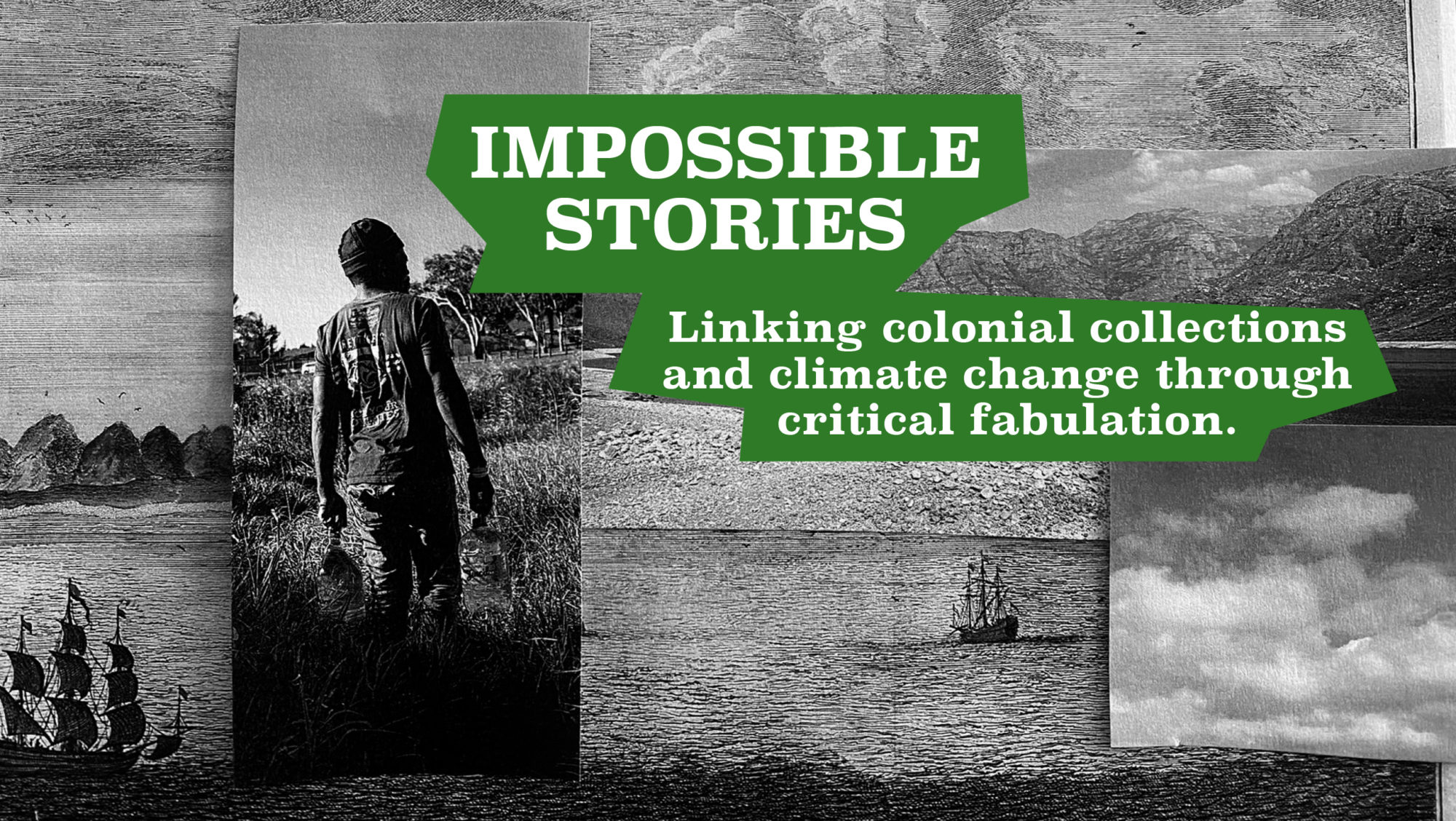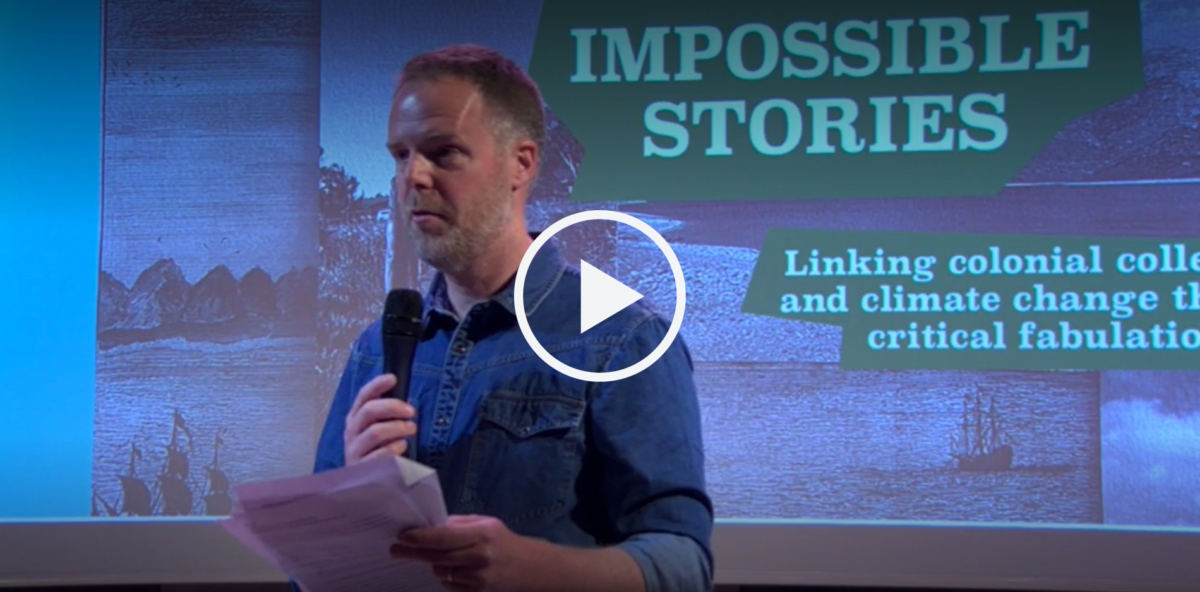Day Zero / Ground Zero Cape Town
A Decolonial Walk along the Liesbeek River
On 20 May 2022 the Impossible Stories: Linking colonial collections and climate change through critical fabulation symposium took place. Curators, artists, and researchers discussed how to tell stories about colonial encounters in relation to the climate crisis. They responded to questions as: How do we move away from the dominant planetary consciousness? How do we mobilise the colonial archive to construct and to imagine the voices that have been silenced? Find the recording of the symposium below (starts at 0:07:00).
Alexander Cromer is a performance artist, storyteller, and critical world-builder currently pursuing a doctorate in art and design. Cromer works as IST and study coach at The Royal Academy of Art in The Hague as well teaches at the University of the Underground. His research focuses on the necessity of the radical imagination to navigate and chart alternative Black ecologies.
Georgie Brinkman is an artist and researcher whose work treads a precarious ground between science-fiction and science-fact (and the muddy sludge in between). A recent graduate from MA Artistic Research at the Royal Academy of Art in The Hague, her work questions the impact of socio-political conditions on ecosystems, particularly in relation to extinction. She is founder of The New Flesh, a residency program for early career artists working with moving image and costume.
Michelle Piergoelam is an art photographer, graduate from The Royal Academy of Art in The Hague, and Associate Researcher at the Research Center for Material Culture. She creates visual stories based on cultural myths, dreams and memories. Her work sheds light on native stories as a way to witness culture and history.
Nick Shepherd is researcher and writer based at Aarhus University in Denmark, and the University of Pretoria in South Africa. His work focuses on two broad sets of issues: colonial and decolonial heritage, and heritage and the climate emergency – raising questions of social justice and restitution. He runs regular walking seminars involving researchers, artists, curators and activists.
Paula Hernandez Mollison is a student at The Royal Academy of Arts in The Hague, whose interests centre around a decolonial approach which aligns with “a more than human world”. Currently, she is researching local plants in Ecuador to explore the relationship with the sensuous which had been blinded by a patriarchal colonial approach.
Shana de Villiers is a student at The Royal Academy of Art in The Hague. Their work uses mainly performance and patched textiles to imagine stories and worlds, narratives born from the sprouts of cultural hybridity and the confusing patchwork of “post-colonial” societies.
Natalia Sliwinska is a multi-disciplinary designer, visual anthropologist and recent graduate from the MA Non Linear Narrative at The Royal Academy of Art in The Hague. Her graduation project explores decolonial rereadings of history and suggests ways of counter-archiving.
Sophie Allerding is an artist, feminist and speculative storyteller, currently finishing the MA in Photography & Society at the Royal Academy of Art in The Hague. Influenced by her Latin American background she explores magical realism and the potential of myths to challenge oppressive narratives. She works with photography, film, sound, text and performance.
Odin Essers is the main curator of Maastricht University’s Special Collections and as such responsible for policymaking, collection management, education and research support, fundraising and outreach. He actively contributes to making these collections as visible, useful and sustainable as possible. An important focus is the ‘Jesuits Library’, Maastricht University’s most important special collection, comprising some 250,000 volumes and many lavishly illustrated travel books.
Ola Hassanain is an artist with an academic background in architecture, cultural identity and globalisation. She has obtained a Master of Fine Arts with distinction at the HKU University of the Arts Utrecht. She is currently a resident at the Rijksakademie. Her artistic research explores the cultural, political dynamics between State and people. She looks at these dynamics through the lens of the built environment.
Angela Jerardi is a writer, researcher and teacher. Her work focuses on the socio-politics of minerals, democracy and critical pedagogy, critical whiteness and climate justice. She is the advisor for student democracy at the Rietveld Academie & Sandberg Institute, and in 2019, she co-founded the Garden Department in collaboration with students.
CREDITS
This is an online project for the Maastricht University Arts and Heritage Committee, realized in collaboration with students Lucinda Maitra, Pepijn Smits, Reanda de Beer, Zoe Zanello and Brendan Harris as well as Cecile Schulte of the Master Arts and Culture, specialization Arts and Heritage, Maastricht University.
Authorship of text, photography and graphic design vis-à-vis the usage of colonial archives is often source of contestation. Rightly so. In acknowledgement of our own privileged position, we hope this exhibition functions as a conservation piece about issues of authorship, historical injustice and the representation of colonials pasts and presents.
CHRISTIAN ERNSTEN
DIRK-JAN VISSER
CHRISTIAN ERNSTEN
DIRK-JAN VISSER
ERIK WONG
WEB DEVELOPMENT
IVO KRUCHTEN
ERIK WONG
IVO KRUCHTEN
For this exhibition a 1727 copy of Peter Kolb’s Naaukeurige en uitvoerige beschryving van de Kaap de Goede Hoop was used. This book is part of Maastricht University’s Special Collections and contains several hand-coloured images.
This project is made possible with the support of the Maastricht University Arts & Heritage Committee, Maastricht University Library, Maastricht Centre for Arts and Culture, Conservation and Heritage and the University Fund Limburg/SWOL.


